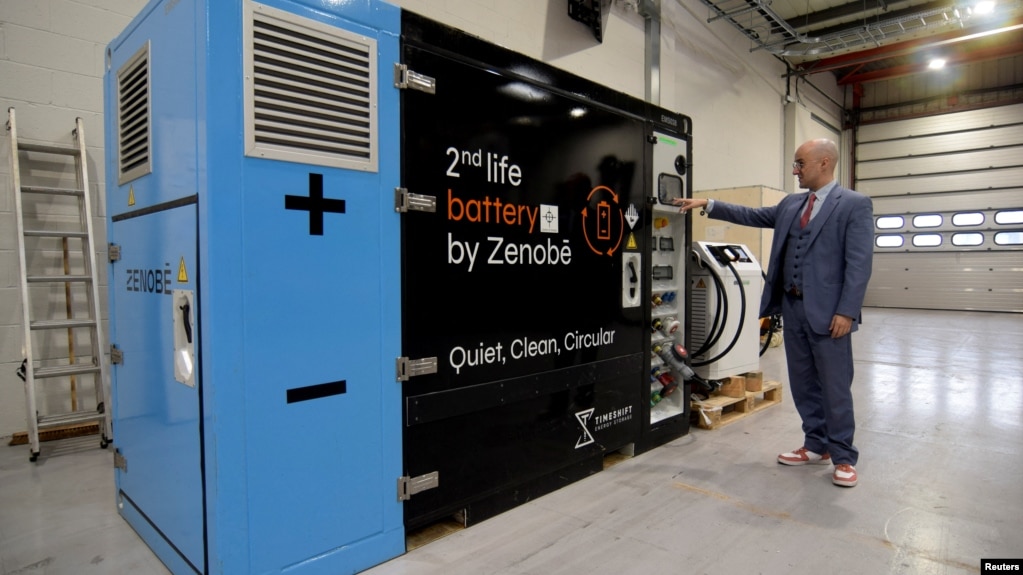Companies Seek to Profit from Old EV Batteries

A number of companies have been established to provide a second life for electric vehicle (EV) batteries. But industry experts say such businesses could face major difficulties, even as the EV market continues to grow.
Reuters news agency reports nearly 50 startup companies have been launched with the aim of buying used EV batteries and reselling them to be used for new purposes. In addition, large carmakers, such as Mercedes and Nissan, have set up their own operations to give EV batteries a second life.
The companies’ founders believe they can find new purposes for used EV batteries from vehicles. The businesses will seek batteries that have been in use for eight to 10 years. The capacity of EV batteries generally falls below 80 to 85 percent during those years. Then, the companies will repurpose the batteries and sell them.
But experts say there is currently a shortage of old EV batteries and this situation is expected to continue in the foreseeable future. One reason for this is that many people are keeping their vehicles for a longer time.
Financial research company S&P Global Mobility notes that EV vehicle owners in the United States are keeping their cars a record 12.5 years. This suggests to experts that many EVs will also stay on the road for years to come even if their batteries are working below capacity.
Hans Eric Melin is the creator of advisory company Circular Energy Storage, which follows battery sales and prices. He told Reuters the idea "that EV batteries are only going to last eight-to-10 years and then owners would swap them out is just not true." Melin added, "It's going to be tricky to make second-life work."
Elmar Zimmerling is the business development manager for automotive at German second-life battery startup Fenecon. He told Reuters that since many EVs built 10 years ago remain in use, there is currently "no market for second-life batteries." But he predicted a flood of used batteries within the next five years.
Another issue is that competition from companies using EV batteries to power everything from gasoline-powered vehicles to boats have driven prices up for used batteries. Circular Energy Storage estimates this pushed prices to $235 per kilowatt hour in late 2022. This is about double the price major carmakers pay for new batteries.
One example is the long-range Tesla Model 3, which has a 75 kilowatt hour battery. At the estimated rate, the Tesla battery would cost $17,625 on the used market.
Some experts say it could even be more profitable for companies to sell needed battery elements rather than whole batteries.
"The ... question is, if you have pretty valuable raw materials in a battery and you ask 'how can I get the most out of it?'” said Thomas Becker. He is the head of sustainability at German carmaker BMW. The company has a second-life battery storage facility at its Leipzig plant. The answer, Becker said, “is recycling might be better."
Demand for used batteries for storage – for homes, businesses or possibly even power grids – is likely to rise as renewable energy forms continue to expand.
By 2030, worldwide battery capacity for grid storage could grow to 680 gigawatt-hours, from 16GWh at the end of 2021, an estimate by the Paris-based International Energy Agency shows.
Britain alone pays around $1.27 billion yearly to turn off wind farms when the grid does not need the power. There is no way yet to store the power because of the battery shortage. Britain also often has to buy electricity from Europe when it cannot produce enough on its own.
Words in This Story
battery – n. a device placed inside a machine to supply it with electricity
capacity – n. the largest amount or number that a container, building, etc. can hold
swap – v. to change one thing for something else
grid – n. a network of conductors for distribution of electrical power
sustainability – n. of, relating to, or being a method of harvesting or using a resource so that the resource is not depleted or permanently damaged
raw – adj. in a natural state
https://learningenglish.voanews.com/a/companies-seek-to-profit-from-old-ev-batteries/7154810.html